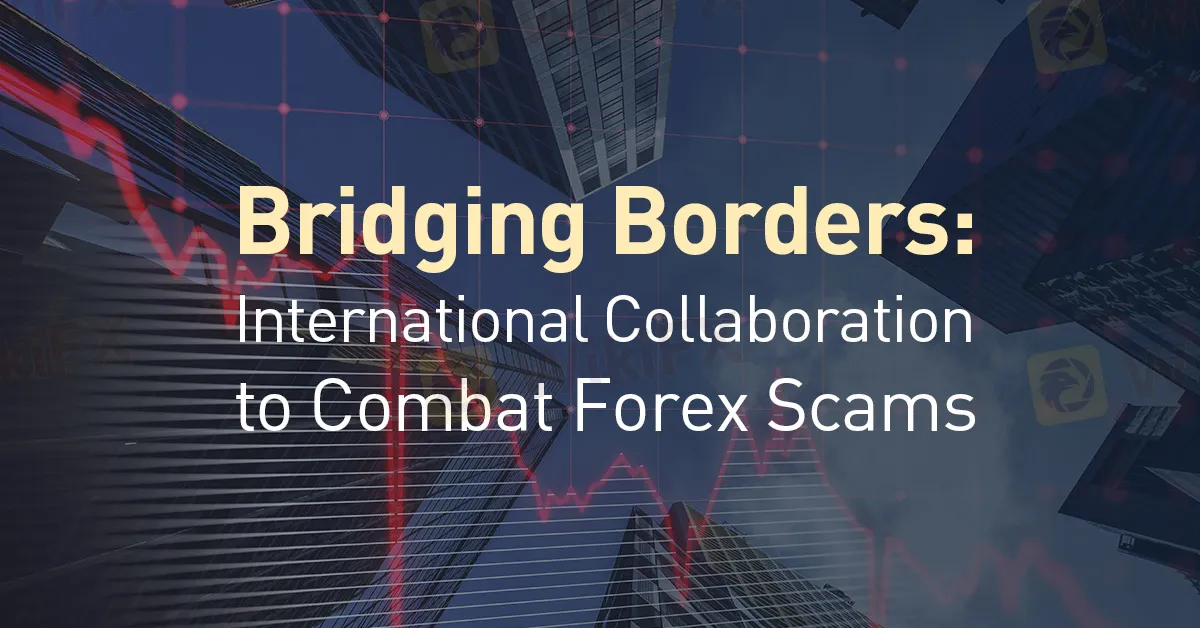简体中文
繁體中文
English
Pусский
日本語
ภาษาไทย
Tiếng Việt
Bahasa Indonesia
Español
हिन्दी
Filippiiniläinen
Français
Deutsch
Português
Türkçe
한국어
العربية
Bridging Borders: International Collaboration to Combat Forex Scams
Abstract:In the interconnected world of forex trading, where borders blur in the digital realm, the battle against scams is a global effort. The United Kingdom and Europe, as integral parts of the international financial network, are not only dealing with domestic scams but also facing the challenges posed by cross-border fraudulent activities. This article explores the collaborative initiatives between countries and international organizations to combat forex scams and promote a unified response to this evolving financial threat.

In the interconnected world of forex trading, where borders blur in the digital realm, the battle against scams is a global effort. The United Kingdom and Europe, as integral parts of the international financial network, are not only dealing with domestic scams but also facing the challenges posed by cross-border fraudulent activities. This article explores the collaborative initiatives between countries and international organizations to combat forex scams and promote a unified response to this evolving financial threat.
The Global Nature of Forex Scams: Crossing Borders Unchecked
Forex scams, facilitated by the borderless nature of online trading platforms, often transcend national boundaries. Scammers exploit regulatory gaps and jurisdictional complexities to operate across multiple countries, making it challenging for individual nations to tackle the issue in isolation.
The Role of Interpol and Europol: Unifying Forces Against Scammers
International law enforcement agencies play a crucial role in the fight against cross-border forex scams. Organizations like Interpol and Europol act as bridges between nations, facilitating information exchange, collaboration, and coordinated efforts to apprehend and prosecute perpetrators. Their initiatives aim to create a unified front against scammers who exploit the global financial system.
Information Sharing: Breaking Down Silos for Swift Action
One of the key challenges in combating cross-border scams is the timely exchange of information between countries. Efforts to break down information silos and establish channels for seamless communication have become integral to the global response. International organizations work towards creating platforms where regulatory bodies from different countries can share insights, trends, and intelligence to identify and neutralize scams more effectively.
Regulatory Harmonization: Aiming for Consistency Across Borders
Harmonizing regulatory frameworks is a crucial aspect of international collaboration. The Financial Stability Board (FSB) and other international bodies strive to encourage consistency in regulatory approaches, making it harder for scammers to exploit regulatory disparities between countries. This harmonization is pivotal in creating a more robust defense against cross-border fraudulent activities.
Public Awareness Campaigns: A Global Call to Vigilance
Educational initiatives, spanning multiple countries, are essential in raising awareness about the risks associated with forex scams. Collaborative efforts between governments, regulatory bodies, and international organizations aim to reach a global audience, empowering traders with the knowledge needed to identify and avoid scams.
WikiFX: A Global Resource for Traders
In the fight against cross-border scams, resources like WikiFX provide a global platform for traders to access information about brokers. WikiFX's comprehensive database includes details on regulatory status, user reviews, and reported scams, contributing to a shared pool of knowledge that transcends national borders.
Visit www.wikifx.com to access WikiFX and join the global community of informed traders.
Conclusion: Forging a Global Defense Against Forex Scams
As forex scams become increasingly transnational, collaboration between countries and international organizations is more critical than ever. By sharing information, harmonizing regulations, and fostering public awareness campaigns, the global community can create a united front against the deceptive practices that threaten the integrity of the international forex market. Platforms like WikiFX, with their global reach, play a vital role in empowering traders with the knowledge needed to navigate the complexities of cross-border trading safely.

Disclaimer:
The views in this article only represent the author's personal views, and do not constitute investment advice on this platform. This platform does not guarantee the accuracy, completeness and timeliness of the information in the article, and will not be liable for any loss caused by the use of or reliance on the information in the article.
Read more

Couple Arrested in Thailand for Billion-Baht Crypto Scam & International Kidnapping
Thai authorities have announced the arrest of 27-year-old Chinese national Wu Di, who is believed to be at the centre of a large-scale cryptocurrency investment scam that has defrauded victims of over 600 million baht (approximately US$17.7 million) within a span of just two months.

Fake Website Forex Scam, Arrests Two for Duping 100+ Investors
Chennai Cyber Crime exposes forex trading scam, arrests two men for cheating 100+ investors via fake websites. Beware of fraudulent investment schemes.

Africa Cybercrime Bust: Over 300 Arrested in Fraud Crackdown
Operation Red Card sees 306 arrests across seven African nations, dismantling major cybercrime networks involved in banking fraud, scams, and phishing.

The Growing Threat of Fake Emails and Phishing Scams
Fake emails and phishing scams are on the rise in crypto, targeting users with fraudulent wallet setup instructions. Stay vigilant and protect your assets.
WikiFX Broker
Latest News
Why Are Financial Firms Adopting Stablecoins to Enhance Services and Stability?
Experienced Forex Traders Usually Do This Before Making a Lot of Money
Octa vs XM:Face-Off: A Detailed Comparison
When High Returns Go Wrong: How a Finance Manager Lost RM364,000
Bridging Trust, Exploring Best—WikiEXPO Hong Kong 2025 Wraps Up Spectacularly
Interactive Brokers Expands Crypto Trading with Solana, XRP, Cardano, and Dogecoin
Fidelity Investments Explores Stablecoin Innovation in Digital Assets Sector
Why More People Are Trading Online Today?
SEC Ends Crypto.com Probe, No Action Taken by Regulator
Broker Comparison: FXTM vs XM
Currency Calculator







